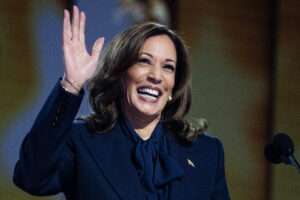The Volokh Conspiracy
Mostly law professors | Sometimes contrarian | Often libertarian | Always independent
Harris Scales Back Harmful Price Control Proposal
The narrower version put forward by her campaign is still bad, but much less so than the much broader one floated earlier.

Several weeks ago, in an article in The Hill, I outlined how both Donald Trump and Kamala Harris have put forward harmful economic policies that exploit widespread voter ignorance. One of the Harris policies I highlighted was a proposal for price controls on groceries. It's therefore only fair that I acknowledge she has since scaled back that proposal.
As originally described, Harris' proposal seemed to be a plan for broad, nationwide controls on grocery prices. The new version put out by her policy team, is still bad, but much less so than before. Michael Strain of the conservative National Review (which is not generally sympathetic to Harris) has the details:
There has been a great deal of confusion around Vice President Harris's plans to combat "price gouging." Last month, her campaign announced that, if elected, the vice president would push for "the first-ever federal ban on price gouging on food and groceries — setting clear rules of the road to make clear that big corporations can't unfairly exploit consumers to run up excessive corporate profits on food and groceries…."
This vague language — along with mixed messages from her advisers and surrogates — led many analysts and commentators to conclude that Harris would use a recent bill from Elizabeth Warren as a template for her policy. Senator Warren's bill is extremely broad and would give enormous power to the Federal Trade Commission to regulate prices.
If enacted, Warren's bill would, of course, be a disaster for the economy. If federal bureaucrats took charge of grocery prices, shortages would occur….
Does Harris support Warren-style price controls? For weeks, we've been left to speculate.
Yesterday [Sept. 24], the vice president released a policy book that answers this question: She does not support Warren-style price controls.
From Harris's book:
"Vice President Harris and Governor Walz's proposal—like many of the laws already on the books in 37 states—will go after nefarious price gouging on essential goods during emergencies or times of crisis. When an emergency strikes, the American people deserve to know the government can take on bad actors that take advantage of a crisis to excessively jack up prices."
The book makes two things clear: Harris would model her plan on existing state laws, not on Warren's bill. And her regulation would kick in only during emergencies….
To be clear, I don't think a federal price-gouging law is a good idea. Such laws at the state level are more defensible, but still questionable. Yes, cases of water became much more expensive in Texas following Hurricane Harvey. But if you were, say, a Colorado-based business that sold water, those higher prices for water in Texas meant that you wanted to stop selling water to folks in Colorado and to start selling it to folks in Texas. That $99-per-case price sent a signal to water sellers all across America that they should be sending more water to Texans than they normally do. The result: More water went to Texans, which was exactly what was needed following the hurricane.
But even though a federal price-gouging law isn't a good idea, it's not a terrible idea. It will likely have no real impact on consumers, producers, or economic activity.
I am less sanguine about Harris's scaled-down proposal than Strain is. What qualifies as an "emergency" or a "time of crisis" is far from clear. In recent years, presidents of both parties have abused "emergency" declarations to circumvent constraints on executive power in order to push through harmful policies, as with Trump's border wall funding diversion and Biden's student loan forgiveness program (eventually invalidated by the Supreme Court). When and if Harris tries to turn her new proposal into an actual bill, it will be important to keep an eye on whether and how the proposed law defines what counts as an "emergency."
In addition, as Strain points out, price controls are harmful even when there is an actual emergency. They tend to produce shortages of vital supplies precisely when those goods are most needed.
Nonetheless, it's worth noting that Harris's current price-control proposal is substantially narrower - and thus much less harmful - than the one originally floated in August. By contrast, Trump hasn't scaled back his even more harmful plans on immigration and tariffs.
It's also worth reiterating that either the narrow or the broad version of Harris's price controls would have to be enacted by Congress. By contrast, Trump could enact most of his most harmful ideas by unilateral executive action. As Trump himself recently put it, "I don't need Congress [to impose tariffs]…. I'll have the right to impose them myself, if they don't." That is one of a number of factors making his agenda more dangerous than Harris's, even though the latter also has serious flaws.


Show Comments (23)